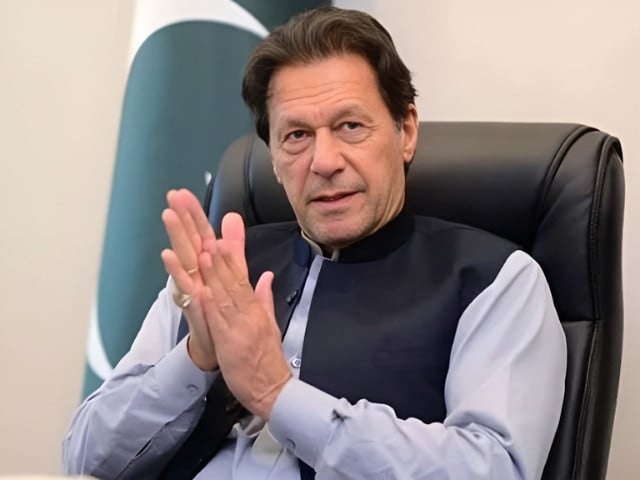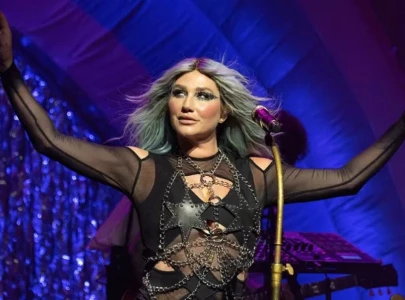
In a major relief, the Islamabad High Court (IHC) on Tuesday granted post-arrest bail to PTI founder Imran Khan in the Toshakhana-II case.
Despite securing post-arrest bail, the PTI founding chairman's release from prison remains ensnared in a web of legal obstacles.
In a late night development, the PTI founding chairman found himself in deeper legal waters after being formally arrested under the Anti-Terrorism Act (ATA) in connection with charges of police resistance, arson and rioting.
The arrest, which came on the heels of an Islamabad High Court (IHC) ruling granting him bail in the Toshakhana case, further piles on the pressure.
The latest arrest of the incarcerated leader adds yet another case to the growing list, with several still pending bail.
According to sources, the police arrested him in the case related to the protests on September 27 and 28, which were registered at New Town Police Station.
The protests were linked to allegations of arson, obstructing police officers, damaging government property and violations under the Anti-Terrorism Act (ATA), specifically sections 7 ATA, 21-I ATA, as well as sections 353, 186, 285, 286, 148, 149, 427, 109 and 188 of the Pakistan Penal Code (PPC).
The case was filed by Sub-Inspector Umar Siddique. A spokesperson for the Rawalpindi police confirmed the arrest.
An investigative team, led by SSP Investigation Saba Sattar, is currently conducting the inquiry. The PTI founder will be presented before the court on Thursday (today) to seek physical remand, and the investigation will continue following the remand hearing.
Earlier, the IHC accepted the bail of former prime minister against surety bonds worth Rs1 million and ordered authorities to release the accused.
The court, however, said that the bail could be withdrawn if the accused didn't cooperate during the trial process.
"The petitioner is cautioned not to misuse the concession of bail and appear before the learned trial court on each and every date of hearing unless a specific exemption is granted by the said court. In the event, the petitioner misuses the concession of bail, it goes without saying that the prosecution can apply for the recall of the bail granting order," read the short order.
The bail does not ensure Imran's release from jail as he faces multiple other cases in which he has yet to be granted bail.
Justice Miangul Hassan Aurangzeb announced the verdict on the bail petition of the PTI founder.
During the hearing, the court questioned what action was taken against the three customs officers responsible for the wrong assessment of the Bulgarian jewelry set.
The FIA's prosecutor said that it was a mistake on their part but it was not criminal misconduct by the officers. The NAB had not recommended any disciplinary action against these officers, he added.
He said that the jewelry set was never submitted to Toshakhana, adding that the accused managed to get a low-value assessment of the set and caused a loss to the national exchequer.
He said that the PTI founder and his wife both benefitted from it. He further said that the court had granted bail to Bushra Bibi but she was not appearing before the trial court which is delaying the indictment process.
He said that the PTI founder misused his position and threatened the person responsible for assessing the value of the jewelry set.
Defense lawyer Barrister Salman Safdar argued that his client was accused of misusing his position for personal gain. He pointed out that while Bushra Bibi's name appeared on the receipt, the challan did not clearly identify the main accused. The roles of both accused individuals in the crime remained unclear, he emphasized.
The lawyer said that the case was registered with a delay of more than three years. He said that the gifts were received under Section II of the Toshakhana Policy 2018.
Whatever the value of the jewellery was assessed, the amount was paid against it, he said, adding that the witnesses had changed their statements after three-and-a-half years.
Giving remarks on the PTI-led previous government, Justice Miangul Hassan said that the previous government was not willing to provide Toshakhana information despite court queries. That government was of the view that Toshakhana details shouldn't be made public.
The court after hearing arguments granted bail to the PTI founder.
Cases
The case document details that the PTI founder had allegedly called for a protest from the Adiala Jail, urging party leaders and workers to join the demonstration.
Khyber Pakhtunkhwa Chief Minister Ali Amin Gandapur had also publicly declared his participation in the protest. However, the provincial government had imposed Section 144 on both September 27 and 28, banning public gatherings.
In defiance, a group of 45 protesters, led by PTI members including Ajmal Sabir, gathered at the protest site, where they chanted slogans against the government and state institutions.
Despite being warned of the ban, they resisted and allegedly set fire to clothing and other materials while throwing burning objects at a police vehicle.
During the unrest, five protesters were arrested, while key figures including Seemabia Tahir and Rashid Hafeez, along with 25-30 other protesters, managed to escape the scene.
The protesters, allegedly at the PTI founder's behest, engaged in violent actions, blocked roads and violated the protest ban, committing criminal acts against government and state institutions.
Consequently, a formal case was registered against them.
According to details, five bail bonds for cases related to the May 9 violence, including the GHQ attack case, have yet to be submitted.
Furthermore, the incarcerated leader is named in three other cases tied to two separate protest demonstrations, leaving him vulnerable to arrest by Rawalpindi police.
According to sources, although Imran had secured bail in 12 cases registered in Rawalpindi over the May 9 incidents, his legal team has not submitted bail bonds for five of them, including the GHQ attack case, in the anti-terrorism court (ATC).
Adding to his woes, Imran has been implicated in a September protest reportedly planned via a phone call from Adiala Jail. The resulting violence led to a case registered at the New Town Police Station, granting Rawalpindi police the authority to detain him.
Similarly, violent protests on October 5, also reportedly called for by the PTI chairman, led to the registration of two additional casesone at the Taxila Police Station and another at the Naseerabad Police Station.
Both cases were filed under anti-terrorism laws, giving police further grounds for potential arrest.
Sources added that upon receiving the release order for the new Toshakhana case, Adiala Jail authorities will formally notify the PTI chairman's legal team in writing.
However, without addressing the pending bail bonds and other legal challenges, his release remains in limbo.
Imran and his wife, Bushra Bibi, were initially apprehended on July 13, shortly after their acquittal in the Iddat case the same day. While Bushra Bibi was granted bail by the IHC last month and subsequently released from Adiala Jail on October 24, Imran has remained incarcerated since his arrest on August 5 last year in the Toshakhana case.
In the latest legal proceedings, the Federal Investigation Agency (FIA) accused the couple of retaining an expensive Bulgari jewellery set gifted by a foreign leader - comprising a necklace, earrings, bracelets and rings - at a fraction of its value.
In September, Special Judge Central Shahrukh Arjumand had scheduled their indictment for October 2, but it was postponed to October 5 at the defence counsel's request. On October 4, Judge Arjumand rejected their post-arrest bail petitions.
The National Accountability Bureau (NAB) has also filed a reference accusing the couple of illegally retaining the jewellery set gifted by the Saudi royal family during their visit to the kingdom in May 2021.
NAB claims the PTI chief and his wife received 108 gifts from foreign dignitaries during Imran Khan's tenure as prime minister. Of these, 58 gifts were allegedly retained for an undervalued sum exceeding Rs142 million.
Following the Supreme Court's decision in September upholding amendments to NAB laws, the case was transferred from an accountability court to a special court under FIA jurisdiction.
Imran Khan's legal troubles continue to mount as both the FIA and NAB pursue separate cases against him and his wife, with allegations of misuse of state gifts and financial irregularities taking centre stage.


1731933289-0/BeFunky-collage-(68)1731933289-0-165x106.webp)


1729662874-0/One-Direction-(1)1729662874-0-165x106.webp)

1732181665-0/Express-Tribune-(9)1732181665-0-270x192.webp)
1732178966-0/BeFunk_§_]__-(22)1732178966-0.jpg)
1732178488-0/Express-Tribune-(7)1732178488-0-270x192.webp)
1732172357-0/BeFunk_§_]__-(18)1732172357-0.jpg)
1732176172-0/Untitled-design-(8)1732176172-0-270x192.webp)






COMMENTS
Comments are moderated and generally will be posted if they are on-topic and not abusive.
For more information, please see our Comments FAQ